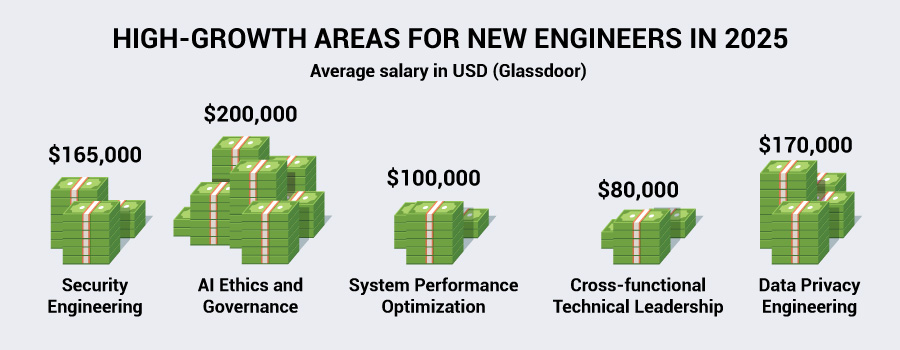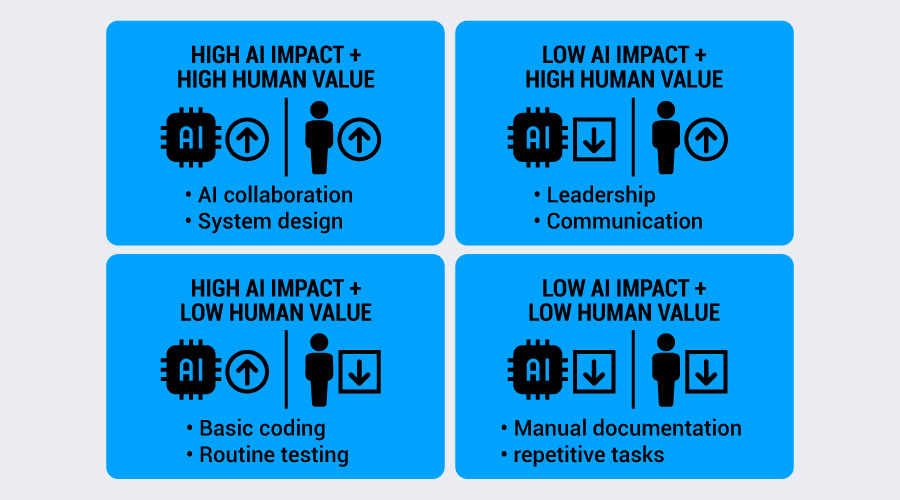The software engineering job market has undergone a seismic shift in the past decade. What once represented a predictable pipeline from computer science education to entry-level positions now resembles a compressed funnel (or more of a sieve?) with higher barriers and evolving expectations.
AI and automation haven’t just changed how we write code. They’ve fundamentally altered what it means to be a junior engineer.
This transformation creates both challenges and opportunities for new graduates. Understanding these dynamics and developing the right strategies can mean the difference between struggling to find your first role and positioning yourself as an indispensable team member from day one.
How AI has reshaped entry-level software roles
The impact of AI on software engineering extends far beyond code completion tools. Entire categories of work that traditionally belonged to junior developers have shifted into AI-assisted workflows, fundamentally changing team structures and hiring needs.
Many foundational tasks that once served as training grounds for new engineers now require minimal human intervention. Simple debugging, basic code refactoring, and routine documentation generation have become largely automated processes. This compression means fewer opportunities for hands-on learning through repetitive tasks that build muscle memory and deep understanding.
The remaining tasks require higher-level thinking, system design understanding, and complex problem-solving skills that were once developed over years of experience.
Team structure evolution and hiring patterns
Engineering teams have adapted to AI’s capabilities by restructuring their approach to talent acquisition. Rather than hiring multiple junior developers to handle routine tasks, many companies now prefer fewer, more capable engineers who can effectively collaborate with AI tools and tackle complex challenges immediately.
This shift has created what industry leaders call the missing middle — a gap where traditional junior roles used to exist. Companies increasingly seek candidates who can operate at what was previously considered a mid-level capacity, even for their most entry-level positions.
The result is a job market where entry-level positions require 2-3 years of equivalent experience, whether gained through internships, personal projects, or intensive self-study. The barrier to entry has risen significantly, but so has the potential impact and compensation for those who successfully navigate this new landscape.
Where opportunities still exist for new graduates
Fortune magazine reported that AI was directly responsible for over 10k job cuts in the US in July 2025. Despite challenges like these, significant opportunities remain for computer science graduates who understand how to position themselves effectively.
The key lies in identifying areas where human creativity, judgment, and complex reasoning remain irreplaceable.
High-value problem-solving roles
Complex system architecture, performance optimization, and cross-functional collaboration represent areas where human expertise continues to provide substantial value. These roles require understanding business context, making judgment calls under uncertainty, and communicating technical concepts to non-technical stakeholders.
Security engineering, data privacy compliance, and ethical AI development have emerged as particularly promising areas. These fields require nuanced understanding of regulations, risk assessment, and the ability to balance technical constraints with business objectives — skills that AI cannot easily replicate.

AI-adjacent and AI-enhancement roles
Rather than competing with AI, many successful new graduates have positioned themselves as AI force multipliers. This includes roles in prompt engineering, AI model fine-tuning, and developing AI-assisted development workflows.
Machine learning operations (MLOps) have become particularly attractive for new graduates. This field combines traditional software engineering skills with understanding of AI model deployment, monitoring, and maintenance. Companies desperately need engineers who can bridge the gap between AI research and production systems.
Developer experience engineering represents another growth area. As AI tools proliferate, companies need engineers who can evaluate, integrate, and optimize these tools within existing development workflows. This role requires both technical depth and understanding of team dynamics and productivity optimization.
Building market-ready skills quickly
Success in today’s AI-influenced job market requires a strategic approach to skill development. The traditional advice of “just start coding” is insufficient when competing against both AI capabilities and other candidates with advanced preparation.
Technical skills that matter most
System design and architecture skills have become non-negotiable for entry-level positions. Understanding how to design scalable systems, make trade-offs between different architectural approaches, and communicate design decisions clearly separates candidates who can contribute immediately from those who require extensive onboarding.
Cloud platform expertise, particularly in AWS, Azure, or Google Cloud Platform, has shifted from nice-to-have to essential. Modern software development is inherently cloud-native, and engineers must understand deployment pipelines, container orchestration, and infrastructure as code from day one.
Database design and optimization skills remain highly valued because they require understanding both technical constraints and business requirements. The ability to design efficient data models, optimize query performance, and understand data consistency trade-offs continues to differentiate strong candidates.
Non-technical skills and AI collaboration
Verbal and written communication skills have become exponentially more important as AI handles routine coding tasks. Engineers must articulate complex technical concepts, facilitate cross-team collaboration, and translate business requirements into technical specifications.
Learning how to effectively prompt and collaborate with AI tools represents a meta-skill that amplifies other capabilities. This includes understanding when to rely on AI assistance, how to validate AI-generated code, and how to use AI tools for learning and problem-solving rather than just code generation.
Project managing and ownership capabilities distinguish junior engineers who can drive initiatives independently from those who require constant direction. The ability to break down complex problems, set realistic timelines, and coordinate with multiple stakeholders has become essential for entry-level roles.

Practical strategies for job search success
Navigating the current job market requires a more sophisticated approach than traditional application strategies. Understanding how hiring processes have adapted to AI-influenced expectations enables more targeted and effective job search efforts.
Portfolio and project selection
Personal projects must demonstrate capabilities that go beyond what AI can easily generate. Instead of building another to-do app, focus on projects that can demonstrate a product-market fit, showcase system integration, performance optimization, or otherwise solve real-world problems with measurable impact.
Open source contributions have become increasingly valuable as they demonstrate ability to work within existing codebases, collaborate with distributed teams, and understand complex software ecosystems. Choose projects where you can make meaningful contributions rather than just document fixes.
End-to-end projects that include deployment, monitoring, and maintenance show operational awareness that many candidates lack. Building something users actually use, even on a small scale, demonstrates understanding of the full software development lifecycle beyond just writing code.
Networking and relationship building
Industry connections have become more crucial as hiring processes become more selective. Attending tech meetups, contributing to online communities, and building relationships with experienced engineers can provide insights and opportunities not available through traditional job boards.
Mentorship relationships — both formal and informal — accelerate learning, enable real-world insights only available through experience, and provide guidance on navigating career decisions. Many successful new graduates have found mentors through open source projects or professional organizations rather than formal programs.
Building a professional online presence through technical writing, speaking at meetups, or contributing to technical discussions demonstrates curiosity and expertise (or at least the desire to gain more) and makes you discoverable to potential employers and collaborators.
Adapting to the new reality of junior engineering
The definition of junior engineer has evolved significantly. Understanding these changes and adapting expectations accordingly helps new graduates position themselves more effectively and set realistic career progression goals.
Redefining career progression
Traditional career ladders assumed gradual skill development over several years of increasingly complex assignments with regular oversight. Current career progression requires more rapid skill acquisition, broader sources of learning, and the ability to contribute meaningfully much earlier in your career.
Continuous learning has shifted from career enhancement to career survival. The pace of technological change means that skills learned in university may become obsolete within 2-3 years, requiring ongoing investment in education and skill development.
Specialization decisions now carry more weight earlier in careers. While generalist skills remain valuable, developing deep expertise in specific areas like security, performance optimization, or AI systems can provide sustainable competitive advantages.
Long-term positioning and growth
Building expertise in areas where human judgment remains critical provides the best long-term career stability. This includes fields like technical leadership, cross-functional collaboration, and strategic technology decision-making.
Understanding business context and developing product sense differentiates engineers who can grow into senior technical roles from those who remain primarily implementers. The ability to connect technical decisions to business outcomes becomes increasingly valuable as careers progress.
Developing teaching, writing, and knowledge-sharing capabilities creates opportunities for leadership roles and helps establish professional reputation. Engineers who can effectively transfer knowledge, mentor others, and contribute to organizational learning often find more career advancement opportunities.
Frequently asked questions
Both are essential, but the balance depends on your career goals. Master fundamental programming concepts first, then learn to effectively collaborate with AI tools. Understanding when and how to use AI assistance makes you more effective, but you still need strong foundational skills to evaluate and debug AI-generated code.
Focus on capabilities that complement rather than compete with AI. Develop system design skills, learn to solve complex problems that require business context, and build strong communication abilities. AI excels at routine tasks but struggles with ambiguous problems that require judgment and creativity.
Language choice matters less than demonstrating proficiency in system design and problem-solving. However, languages commonly used in AI and machine learning (Python, JavaScript, Go) offer more opportunities. Choose based on the specific industry or role you’re targeting rather than trying to learn everything.
Extremely important. AI tools can generate code, but they can’t determine whether that code is efficient, scalable, or appropriate for the specific context. Understanding algorithms, data structures, and system design principles enables you to effectively evaluate and improve AI-generated solutions.
Thriving as a junior engineer in the AI era
The software engineering job market has fundamentally changed, but opportunities are there for graduates who understand how to take initiative and position themselves effectively. Success requires adapting to new expectations, developing skills complementary to AI capabilities, and building expertise in areas where human judgment and creativity remain irreplaceable.
The junior engineers who thrive will be those who embrace AI as a collaborative tool while developing uniquely human capabilities like system thinking, cross-functional communication, and complex problem-solving. Rather than viewing AI as competition, consider it an opportunity to focus on higher-value work and accelerate your professional development.
Start building your skills by identifying areas where you can provide value that AI cannot easily replicate. Focus on projects that demonstrate end-to-end thinking, contribute to open source initiatives that showcase collaboration skills, and develop the communication skills that will set you apart in an increasingly automated field.
The path forward requires more intentionality and strategic thinking than previous generations of engineers needed, but the opportunities for those who successfully navigate this transition are greater than ever. The key is understanding that being a junior engineer no longer means starting at the bottom, it means starting as a capable professional who can immediately contribute to complex, meaningful work.

